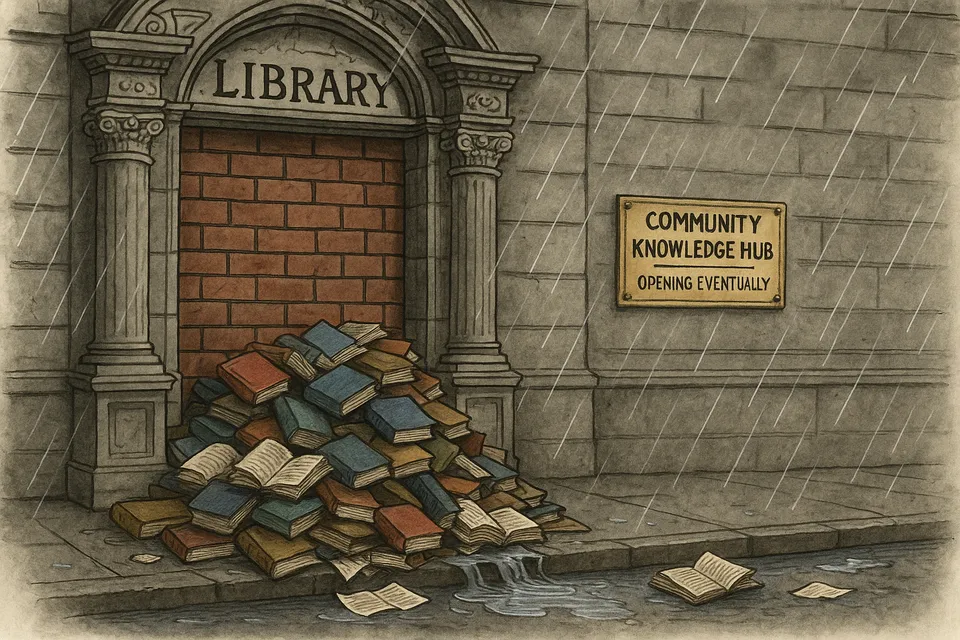The Great Croydon Book Dump: When Public Knowledge Becomes Pavement Litter

A Community's Loss, A Society's Shame
Council contractors in Croydon have been photographed dumping hundreds of library books onto the pavement outside the shuttered Broad Green Library, treating decades of accumulated knowledge like household rubbish. The mayor calls it "unacceptable" and promises action against the contractors. But the real story isn't about careless workers or damaged books. It's about what happens when a society stops valuing the infrastructure of literacy itself.
This isn’t just about books on concrete. This is the physical manifestation of Britain’s deliberate retreat from universal public education and knowledge access. When Croydon Council closed Broad Green Library last year, along with three others, they framed it as necessary cost-cutting. The books scattered across the pavement reveal what “cost-cutting” actually means: the systematic abandonment of civic infrastructure that took generations to build.
The library had already been starved to near-death, operating just two days a week before its closure. Now we learn the building was subsequently occupied by squatters who sectioned it into makeshift bedrooms and rented them to vulnerable people. A public asset meant for community learning became an unregulated slum, then a dumping ground.
The Evidence
The facts paint a picture of cascading institutional failure:
The Closure Decision: Four libraries shut in Croydon alone, justified by “low usage” - usage that was low because the library only opened two days per week. Create the conditions for failure, then cite that failure as justification for cuts.
Security Vacuum: After closure, the building was left unsecured long enough for squatters to establish a makeshift rental operation inside. Mayor Perry’s video shows kicked-in doors and damaged masonry. No one was watching. No one was responsible.
Contractor Negligence: Council-employed contractors treated library books like waste material. Not donated, not redistributed, not even properly disposed of - simply dumped on the street. This reveals how little value the council actually places on these resources, despite the mayor’s protestations about books being “precious.”
The Privatization Solution: The building will reopen as a community center run by the Asian Resource Centre of Croydon, a charity. The books will supposedly still be available, but under what conditions? With what funding? For how long?
The Pattern
This incident connects to a broader dismantling of Britain’s knowledge infrastructure:
Since 2010, the UK has lost over 800 libraries - nearly one in five. Those remaining often operate on reduced hours with volunteer staff. The professional librarian, once a cornerstone of community education, is becoming extinct.
Library spending by councils has fallen by £270 million in real terms over the past decade. What remains increasingly relies on volunteers and charity operations, transforming a universal public service into a patchwork of good intentions.
The same councils claiming they can’t afford libraries are often the ones declaring effective bankruptcy, like Croydon did in 2020. The money hasn’t disappeared - it’s been redirected through mismanagement, vanity projects, and failed investments.
The Reality Check
Mayor Perry’s response reveals the political theater around decline. He expresses dismay at books on pavements and promises contractor accountability, but he was the one defending these closures just months ago. His administration created the conditions for this exact outcome.
The claim that the new community center will have “expanded opening hours” compared to the library’s two days per week is meaningless. Any opening hours would be an expansion from two days. This isn’t improvement; it’s managing expectations downward until anything seems like progress.
When squatters can take over a former library and turn it into unauthorized housing, it reveals something darker: even irregular, potentially exploitative accommodation serves more immediate human need than a library in modern Britain. The hierarchy of desperation places basic shelter above basic literacy.
The Bigger Picture
The Croydon book dump is decline made visible. Not the dramatic collapse that makes headlines, but the slow abandonment of civilizational infrastructure. Libraries aren’t just book storage facilities - they’re the physical manifestation of a society’s commitment to universal access to knowledge, quiet study space, internet access for those without it, and professional information services.
When libraries close, we lose more than books. We lose homework clubs for children whose homes lack study space. We lose internet access for job seekers without computers. We lose community meeting spaces. We lose one of the last truly public spaces where you don’t need to spend money to exist.
The transition from public library to charity-run community center represents a fundamental shift: from universal provision to charitable dispensation. From rights to hopes. From professional service to volunteer effort. From permanent to provisional.
Those books on the Croydon pavement aren’t just damaged property. They’re the scattered remains of the post-war consensus that knowledge should be freely accessible to all. Each volume on concrete represents a step backward from the principle that a civilized society maintains public institutions for public good, not private profit or charitable whim.
The mayor says books are precious. If they were truly precious, they wouldn’t be in the hands of the lowest-bidding contractor. They wouldn’t be cleared from buildings left to squatters. They wouldn’t be replaced by charity operations dependent on goodwill and donations.
This is what institutional decline looks like: not with grand pronouncements, but with books on pavements and politicians pretending to be shocked by the entirely predictable consequences of their own decisions.
Commentary based on Library books dumped on Croydon pavement 'unacceptable' by James W Kelly on BBC News.